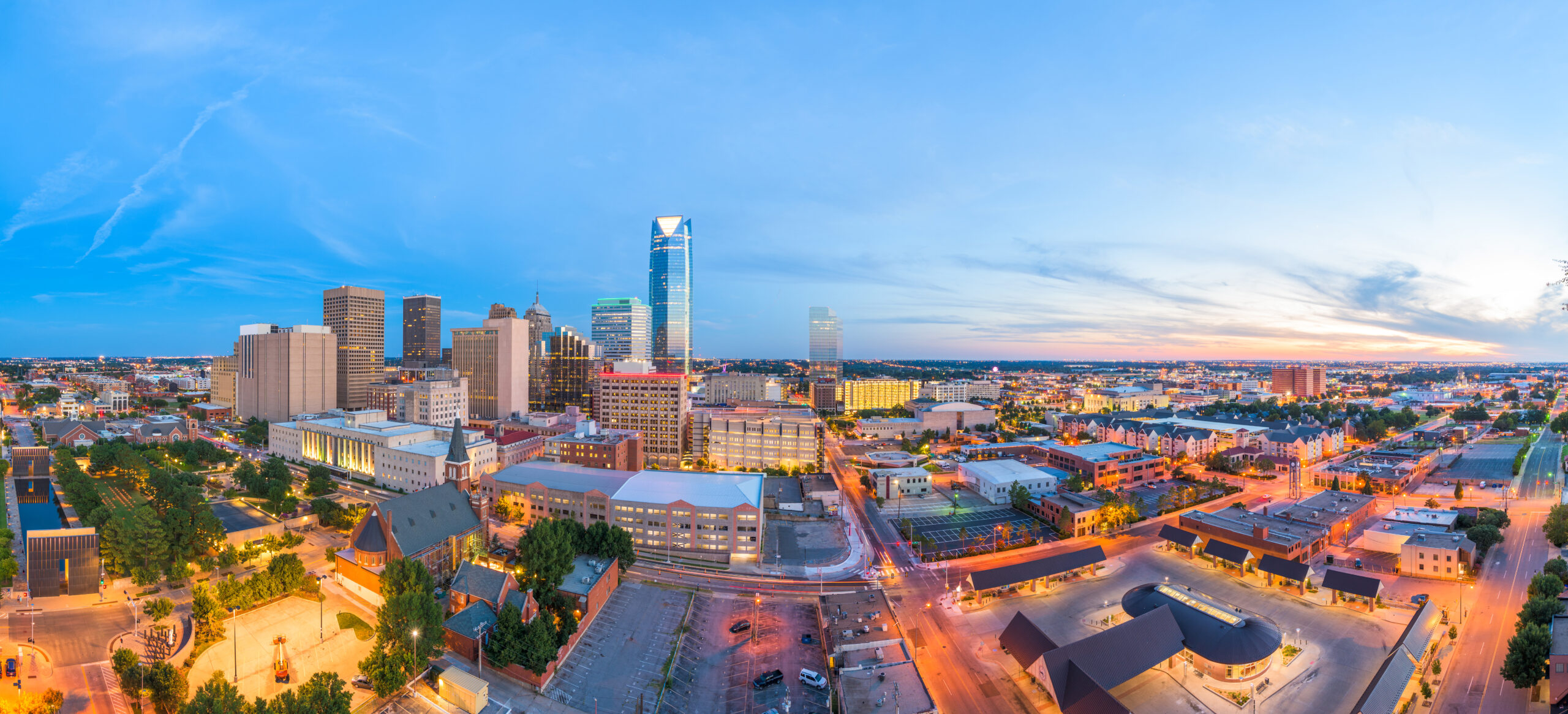Mayor Holt announces plan to build new arena without raising taxes, includes commitment by the Thunder to play in new arena beyond 2050 if voters approve
Written by Wilson on September 26, 2023


09/12/2023
After 14 months of public discussion and collaborative dialogue between Oklahoma City leaders and the leadership of the Oklahoma City Thunder, a plan has been finalized to construct a new downtown arena that will keep the Thunder in Oklahoma City for a generation and beyond 2050.
The new arena will also secure Oklahoma City’s status as a destination for premier concerts and similar events. The plan for the new arena and the commitment from the Thunder is conditional on passage by Oklahoma City voters on December 12 of a temporary one-cent sales tax that will not raise taxes. The temporary tax will start after the conclusion of MAPS 4 and will not increase the City’s current sales tax rate. Mayor David Holt and City Manager Craig Freeman will formally bring the elements of the plan to the City Council on Tuesday, September 26 to officially refer it to the people of Oklahoma City for their consideration. A simple majority of the Council is required to call for the December 12 election, and a simple majority of voters is required for passage on December 12.
Mayor Holt and Freeman will also present to the Council on September 26 a letter of intent signed by Oklahoma City Thunder Chairman Clay Bennett, committing the Thunder to play 25 years in the new arena if the December vote is passed and related legal documents are completed.
Completion of a new arena and retention of the City’s big league status guarantees the City will continue to receive the enormous economic benefits it has enjoyed since the Thunder’s arrival in 2008. Oklahoma City will also maintain its regional competitive position to attract the other major concerts and events that use the arena, will retain the international brand and identity of being a big league City, will enjoy the community unity the Thunder has brought OKC and the philanthropy that the NBA has delivered to countless causes in the community.
One economic impact study pegs the direct annual economic impact of the Thunder at $600 million and 3,000 jobs. Additionally, since the Thunder’s arrival just 15 years ago, the City’s GDP has grown 62 percent. And since 2008, Oklahoma City has moved from America’s 31st-largest to its 20th-largest City.
Even before the arrival of major league professional sports, Oklahoma City residents have long understood that a modern downtown arena is the centerpiece of the City’s quality of life and critical to the City’s economic growth.
The voters of OKC first passed a tax to fund a downtown arena in 1927 (Municipal Auditorium). In 1962 (35 years later), the voters again passed a tax for a new downtown arena (the Myriad). In 1993 (31 years later), the voters again passed a tax for a new downtown arena (Paycom Center). It has been exactly 30 years since the last commitment, and in fact the December 12 election will fall two days shy of the 30th anniversary of the passage of the original MAPS, which included the current arena.
For the first time, the City is seeking to replace its arena with the added urgency created by the presence of a major league professional sports team – the Oklahoma City Thunder of the National Basketball Association. The Thunder’s long-term agreement to stay in Oklahoma City expired earlier this year. However, the Thunder have shown their commitment to the City by exercising a short-term extension to allow for a collaborative process to develop a long-term arena solution. In less than three years from now, there will be no legal agreement in place to retain the Thunder in OKC, and it will take years to design and construct a new arena, bringing urgency to the need for a commitment this year. These issues were first raised publicly by Mayor Holt over a year ago, in July 2022.
The City’s current arena is the smallest in the NBA by square footage, it has the second-smallest capital investment of all NBA arenas, and at 21 years old, it is increasingly within range of the oldest arenas in the entire NBA. OKC’s current arena is not capable of securing a long-term lease with an NBA team. Meanwhile, there are U.S. markets larger than Oklahoma City that don’t have an NBA team, some of which already have or are planning an NBA-ready arena. Also, without a new arena, it will prove more and more difficult for Oklahoma City to retain and attract new major concerts, family shows, and other similar events. The plan announced today addresses all those issues and does so without raising taxes. Major elements of the plan include:
- To retain major league professional sports, world-class concerts and other major events that drive economic growth and define the City’s quality of life, Oklahoma City will construct a new publicly-owned downtown arena, the fourth in City history.
- The Thunder commit to play their home games in OKC for 25 years in the new arena, provided the voters approve the funding for a new arena and related legal documents are completed. This commitment preserves Oklahoma City’s big league status for another generation, maintaining the economic impact and other benefits the City has enjoyed since the Thunder’s arrival in 2008.
- The Thunder will continue playing at Paycom Center while the new arena is designed and constructed, bringing the team’s entire commitment to a length of time that will last beyond 2050. The total commitment is twice the length of the original commitment made in 2008.
- The project cost for the new arena will be a minimum of $900 million. The project will be funded primarily through three funding sources:
- A temporary one-cent sales tax lasting 72 months that will begin after the expiration of the current MAPS 4 one-cent sales tax. The current sales tax rate in Oklahoma City will remain the same as it is today and there will be no tax increase. The method of using sales tax shares the overall tax burden with the many visitors who enjoy events at Oklahoma City’s downtown arena, as it is generally estimated that approximately a quarter of all sales tax in Oklahoma City is paid by non-OKC residents.
- At least $70 million from MAPS 4 that was previously earmarked for OKC’s downtown arena.
- A $50 million contribution by the owners of the Oklahoma City Thunder toward the publicly owned arena.All three of Oklahoma City’s previous downtown arenas have been paid for entirely by taxpayers. The $50 million contribution committed by the owners of the Oklahoma City Thunder to the new arena is a first in City history.
- The City and the Thunder agree that their intent is to open the arena in time for the 2029-2030 NBA season, if not sooner.
This proposal continues a methodical strategy that the OKC community has pursued since 2017 to invest in key priorities. In 2017, the voters approved nearly $800 million for street repairs and approved funding for 120 more police officers. In 2019, voters approved $1.1 billion through MAPS 4 to address quality of life, especially human and neighborhood needs. In 2022, Oklahoma County voters approved funding for a new jail and OKCPS voters approved $1 billion for public school infrastructure. All of those efforts are still ongoing. Now, residents have the opportunity to invest in the City’s economic growth, helping to ensure the continued success of all other initiatives.
Previous deals to secure an NBA team for OKC in 2005 and 2008 had days or weeks for public input and debate. Mayor Holt intentionally kicked off this conversation in July of 2022 – 18 months before a potential vote – to allow unprecedented opportunity for public input. That input has been incorporated into the plan.
“As this very public discussion played out over the last year, the people of Oklahoma City have overwhelmingly expressed to me two desires – 1) keep the Thunder for as long as possible, and 2) don’t raise taxes if it can be avoided. We have accomplished those two priorities with this plan, and it is truly a win-win for all of us,” said Mayor Holt. “Perhaps the most important aspect of the deal is the length – this is twice the commitment we received in 2008 and will keep the Thunder here beyond 2050. My children will be my age when this agreement ends. For a generation, we will retain the economic impact and quality-of-life benefits we have enjoyed as a big-league City. It is an investment that pays for itself many times over. With this new arena, we will also continue the aspirational investments in ourselves that our residents have made for a century. We will construct an arena worthy of America’s 20th-largest City, leaving a legacy to future generations.
“It is also worth noting that the team ownership’s $50 million contribution is a first in City history, and that commitment to this community is deeply appreciated. I commend and thank Clay Bennett and the entire Thunder organization for their collaboration during this process. I also want to thank the City Council, many of whom have reached out to me many times over the past year to contribute feedback to this process. That feedback – as well as that of the public – has certainly been incorporated. I want to also thank the City Manager and his team for their incredibly hard work to this point. Now, I look forward to presenting this win-win to our residents for their vote on December 12.”
“For fifteen years the Thunder has been honored to help lead the transformation of Oklahoma City and enhance the tremendous pride our citizens have in their community,” said Oklahoma City Thunder Chairman Clay Bennett. “We now have an opportunity to build on that progress, advance our status as a true big-league City, continue to grow our economy and secure the long-term future of the Thunder. We look forward to continuing our partnership with Mayor Holt, members of the City Council, and the forward-thinking business and civic leaders in our community. Together we can develop an arena to serve as a crowning achievement in the ongoing renaissance of Oklahoma City.”
The post Mayor Holt announces plan to build new arena without raising taxes, includes commitment by the Thunder to play in new arena beyond 2050 if voters approve first appeared on CBS Sports.







